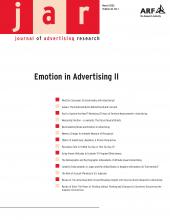Click on the PDF link for the complete article.
ABSTRACT
Measures of TV program effectiveness rely on exposure broken out by demographic categories as the standard for purchasing commercial time. Attitudes toward a program might provide supporting evidence regarding program effectiveness. Yet such data are not typically used in the negotiations between advertisers and networks in TV buys. This article examines the key hypothesis that program attitudes are related to future program exposure. It demonstrates that program attitudes in a prior period are at least as strongly related to subsequent exposure as is exposure to the program in prior periods. The analyses also found that program familiarity has a positive effect on subsequent exposure only in conjunction with positive attitudes. Independent of positive attitudes, familiarity has little effect on subsequent exposure.
- © Copyright 2006 The ARF. All rights reserved.
ARF MEMBERS
If you are a member of the Advertising Research Foundation, you can access the content by logging in here
Log In
Pay Per Article - You may access this article (from the computer you are currently using) for 30 days for US$20.00
Regain Access - You can regain access to a recent Pay per Article purchase if your access period has not yet expired.





